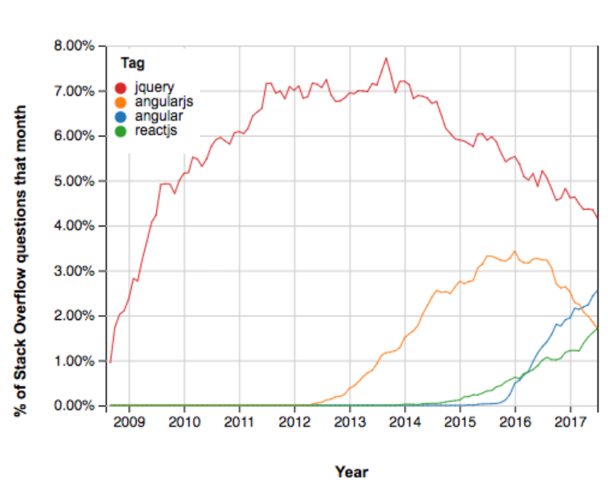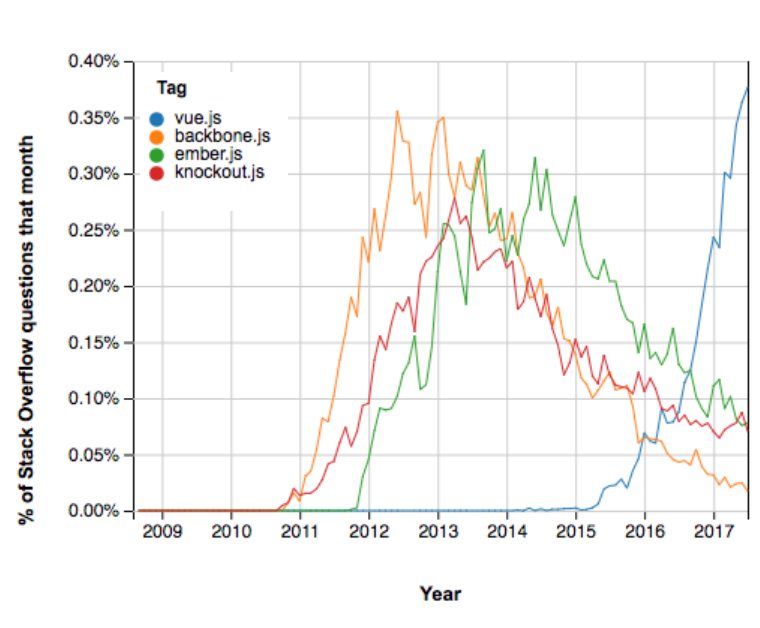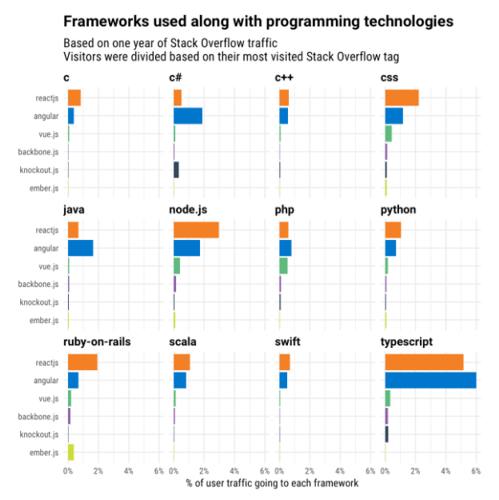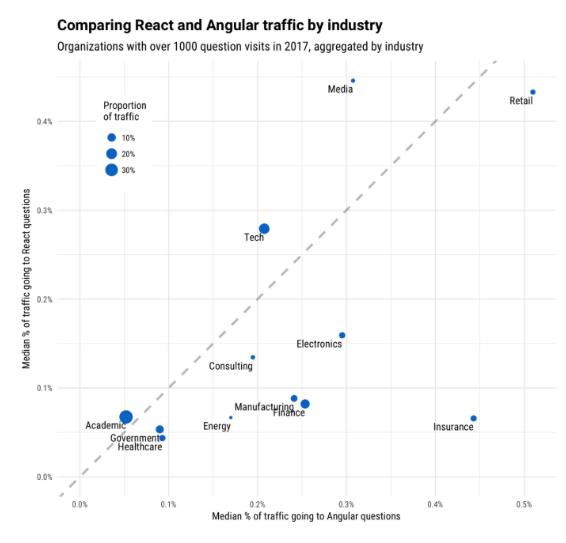| Stack Overflow Analysis of JavaScript Framework Trends |
| Written by Janet Swift | |||
| Monday, 15 January 2018 | |||
|
An analysis of JavaScript frameworks based on the proportion of new questions asked about them on Stack Overflow claims that they share a pattern of a quick ascent in popularity followed by a steady decline in interest. For a blog post describing this as a "brutal lifecycle", Ian Allen used the Stack Overflow Trends tool and some of Stack Overflow's traffic data with a selection of UI frameworks. This isn't the first time JavaScript frameworks have been scrutinized. When the interactive trends tool made its debut in May 2017, David Robinson used JavaScript frameworks in the examples he cited. His comment made then about a similar set of technologies was: Smaller web frameworks show a brutal life cycle, where some show rapid growth then decline over the span of a few years. Because you can't see what is happening if you chart all the packages together as the occupy very different part of the scale range Allen split them into two groups of larger frameworks (i.e jQuery, Angular.js, Angular 2+ and React):
and smaller ones (i.e. Backbone, Knockout, Ember and Vue.js). Commenting on this chart Allen writes: There appear to be two major phases in JavaScript framework usage. There appears to be a quick ascent, as the framework gains popularity and then a slightly less quick but steady decline as developers adopt newer technologies. Looking for factors that influence a developer's interest in a particular framework Allen did a further analysis putting developers into groups based on the tag they visited most using one year of Stack Overflow Traffic: It's worth noting the scale on the x-axis - it goes up to 6% in each case and getting over 3% is pretty rare. Remarking on the strong relationship of Angular to TypeScript reminds us that Angular (although not AngularJS) is written in TypeScript. Other points made in the blog post are:
By matching the IP addresses of Stack Overflow users in the United States to companies Allen compared the traffic for React and Angular by industry. Again the percentages are very small - with 0.4% being the top value on the y-axis and 0.5% on the x-axis.
Reflecting on the fact that media and retail use React and Angular respectively more than other industries, Allen surmises: "these industries tend to gravitate to newer technologies to bring rich client-side experiences to their users to engage with content and refine the online shopping experience. This contrasts with the academic, government, and healthcare sectors, which appear to have little need for these types of frameworks. This may be because those industries are relatively more concerned with database management or data analysis rather than front-end web development." He also poses a question The largest outlier and mystery is the insurance industry. Compared to other industries, Insurance companies as a whole seem to use Angular at very high rate, without using much React... if there are any developers who work for an insurance company reading this, feel free to leave your conjecture in the comments. An answer comes from Rick Dane who posted: having worked at one insurance company for a few years, my guess would be because Angular is the oldest of the frameworks and insurance companies tend to be very conservative and use more antiquated technologies. The comments also raise two main criticisms of the analysis as a whole. One is that by working in percentages of the total number of questions asked on Stack Overflow, entirely unrelated technologies which come onto the scene and provoke a new influx of questions can affect the apparent interest in the topic of concern. The other flaw is equating new questions with the degree of interest in an established technology. A comment for Marty McKeever points out: Do you think after 5 or 6 years most of the good questions had been asked about jQuery and most of the good answers upvoted sufficiently and most of the redundant "new" questions moderated out of existence? New questions don't measure popularity or adoption, they measure ambiguity which favors the new and undocumented. So the steep increase in questions - such as that currently being experienced for Vue.js - is because people who are interested in it can't find what they need to know in the current documentation and therefore ask questions. Once all the important questions have been asked and answered Vue will appear to diminish in popularity - although instead it may simply have reached a stable phase. Yes, React and Angular are currently attracting the most attention as JavaScript frameworks, but when developers are actually asked about their choice of JavaScript library, it is jQuery that is still the firm favourite.
More InformationThe Brutal Lifecycle of Javascript Frameworks Related ArticlesExplore Your Favorite Topic With Stack Overflow's Interactive Trend Tool jQuery Still Our Favourite Framework
To be informed about new articles on I Programmer, sign up for our weekly newsletter, subscribe to the RSS feed and follow us on Twitter, Facebook or Linkedin.
Comments
or email your comment to: comments@i-programmer.info |
|||
| Last Updated ( Wednesday, 10 April 2019 ) |






